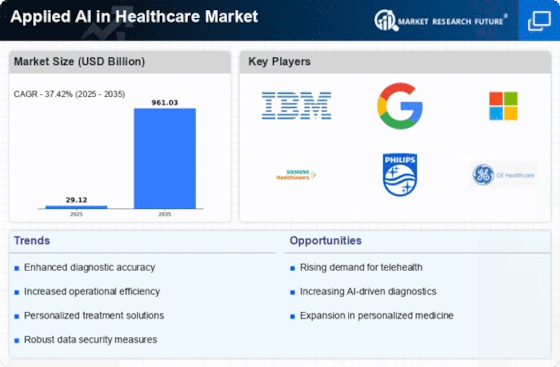Top Industry Leaders in the Applied AI in Healthcare Market

Competitive Landscape of Applied AI in Healthcare Market:
The healthcare sector is witnessing a dramatic transformation driven by the integration of Artificial Intelligence (AI). This rapidly evolving market presents tremendous opportunities for companies offering diverse AI-powered solutions across the entire healthcare spectrum. Understanding the competitive landscape is crucial for both established players and new entrants seeking to navigate this dynamic space.
Key Players:
- Welltok, Inc.
- Intel Corporation
- Nvidia Corporation
- Google Inc.
- IBM Corporation
- Microsoft Corporation
- General Vision, Inc.
- Enlitic, Inc.
- Next IT Corporation
- iCarbonX
- Other Players
Strategies Adopted:
Companies are employing various strategies to gain a foothold in the market:
- Technological Innovation: Continuous development of advanced algorithms, leveraging cutting-edge technologies like machine learning and natural language processing, is key to differentiation and attracting customers.
- Specialization: Focusing on specific applications like oncology, cardiology, or mental health allows companies to cater to particular needs and build expertise.
- Partnerships and Collaborations: Strategic alliances with hospitals, research institutions, and pharmaceutical companies facilitate data access, market reach, and tailored solutions for diverse healthcare settings.
- Data-Driven Approach: Leveraging large datasets for algorithm training and validation strengthens accuracy and builds trust with potential clients.
- Regulatory Compliance: Ensuring adherence to stringent healthcare regulations and data privacy norms is crucial for market acceptance and long-term success.
Factors for Market Share Analysis:
- Product Portfolio: The breadth and depth of AI solutions offered, addressing various healthcare needs, plays a significant role.
- Algorithm Accuracy and Clinical Validation: Proven performance and reliability of AI algorithms are essential for adoption by healthcare providers.
- Interoperability and Integration: Seamless integration with existing healthcare systems and electronic health records facilitates smooth workflow adoption.
- Pricing and Reimbursement Models: Cost-effective solutions and alignment with existing reimbursement pathways are crucial for market penetration.
- Brand Reputation and Trust: Established names and a proven track record in healthcare inspire confidence and facilitate wider adoption.
New and Emerging Companies:
The market is constantly evolving with new entrants offering innovative solutions:
- AI-powered drug discovery platforms: Atomwise, BenevolentAI, and Insilico Medicine are utilizing AI to accelerate drug development and personalized medicine.
- Mental health chatbots and virtual assistants: Woebot, Talkspace, and Tess are employing AI to offer mental health support and improve access to care.
- Blockchain-based healthcare data platforms: MedRec and HIQ Ledger are leveraging blockchain technology to secure and manage healthcare data, enabling new AI applications.
Current Company Investment Trends:
- Focus on specific applications: Companies are increasingly focusing on specialized AI solutions for particular diseases or patient populations, addressing specific unmet needs.
- Cloud-based platforms: The shift towards cloud-based AI platforms offering scalability and accessibility is gaining momentum.
- Remote patient monitoring and telehealth: AI-powered remote monitoring solutions and telehealth platforms are witnessing increased investments due to their potential to improve access to care and reduce costs.
- Predictive analytics and personalized medicine: Investments are surging in AI-powered tools for disease prediction, personalized treatment plans, and preventative care.
Latest Company Updates:
January 12, 2024, The FDA granted marketing authorization to an AI algorithm called "LungVision" developed by C3.ai. LungVision analyzes chest X-rays to detect lung nodules with high accuracy, allowing for earlier diagnosis and intervention in lung cancer.
January 10, 2024, Google AI and Stanford Medicine have announced a collaboration to develop AI-powered surgical robots that can assist surgeons with greater precision and efficiency. The project aims to improve surgical outcomes and reduce complications.










